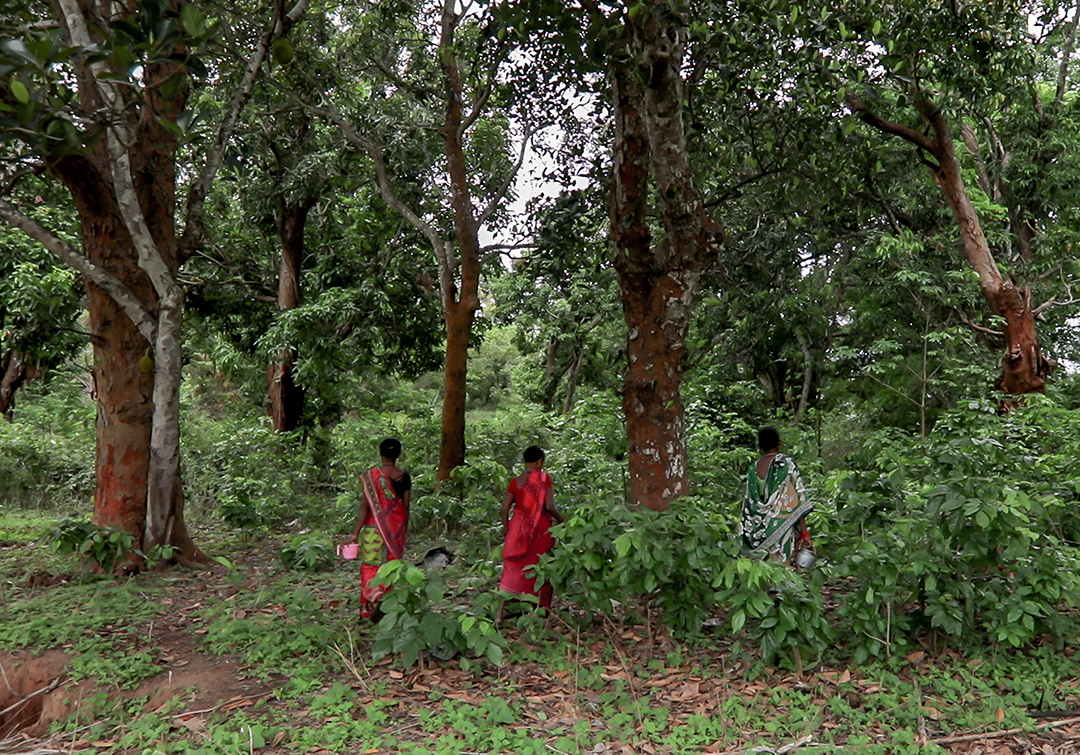Every household in Gundiribadi village gets toilets, bathrooms, water and light
StoryBy Priya Pillai
13 December 2018
The initiative by tribal women, in the Gundiribadi village, to get water eventually led every household in the village to have water, toilets, and electricity.

The initiative by tribal women, in the Gundiribadi village, to get water eventually led every household in the village to have water, toilets, and electricity.
Photograph from Gram Vikas archive.
“We thought our dream of getting water in our houses will remain just that. A dream.”, says Bhimsen Pradhan. In his small village of 25 households of Kandha tribe, in Gundiribadi village, in Ganjam district in Odisha, everyone defecated in the open and went to the village river or pond to bathe. The two village wells gave water for drinking and cooking. This was in 2010.
Gram Vikas had been working in the village on livelihoods, non-formal education, health and self-help groups (SHGs). The water-sanitation work had not yet started as income and food were the community priorities. But for women, who spent three to four hours daily and walked long distances to fetch water, it was an equally pressing need. In summers, the water sources – the river, village pond and the dug wells – dried up. The water was also unclean.

In communities with no access to water, women continue to carry the uneven burden of water work. Photograph by Ajaya Behera.
The women approached Gram Vikas to help them resolve the water issue. However, women still could not see the link between open defecation, water quality and poor health. Gram Vikas saw this as an opportunity to raise awareness among the community about the link between good sanitation practices, water sources, and health. They agreed to support if the community were willing to also construct toilets.
By 2013, each of the households in the village had a toilet, bathing room and three piped water supply connections including in the kitchen. The water was pumped to the water tank from where it was supplied to the houses.
In October 2014, Cyclone Phailin struck the coast of Odisha and caused severe rain and floods. Houses and electric poles in the village were washed away disrupting the water supply along with the loss of livelihoods. “We felt like we were not destined to benefit from the Water Supply project implemented by Gram Vikas,” remembers Bhimsen.
After a few months, with news coverage from national media highlighting the plight of the village in darkness, new electric poles were installed and connection restored. However, soon after the transformer burnt plunging the village into darkness again.

A community meeting of village women. Photograph by Ajaya Behera.
Determined to find a sustainable solution, the Village Water and Sanitation Committee (VWSC) met Gram Vikas with the issue. There was already a transformer that Gram Vikas had set up for pumping water to the tank and supply to houses. After discussions, they decided to use a three-phase transformer to provide water as well as electricity to the houses. And now they have not uninterrupted water and electricity at homes.
As a testament to community ownership being critical to sustaining solutions, the VWSC uses money from their fund to maintain the infrastructure. Bhimsen is joyous, “It was such a delight to have both power and water in each household of our village after such a long time. We actually had thought bad luck would never stop following us. But we realised again that it is only our effort which makes it all possible”.
Every household in Gundiribadi village gets household level piped water supply after Gram Vikas’ programme.
Photograph by Ajaya Behera
ACKNOWLEDGEMENT
Urmila Senapati’s inputs helped craft this story. She is a Senior Programme Manager with Gram Vikas and has been with the organisation for 30 years.
ABOUT THE AUTHOR
Priya Pillai is a Strategic Communications expert for nonprofits.
RELATED BLOGPOSTS
Water ushers in a new dawn in the life of Raidih’s farmers
Raidih’s farmers embrace sustainable agriculture and irrigation advancements, heralding a prosperous, water-efficient era in farming.
Gajendra Sahu’s kitchen dreams find wings in his village Adri
Gajendra Sahu transforms his culinary skills into a thriving village enterprise, inspiring Adri’s youth.
From one farmer’s soil to another: how Lochan’s journey in Odisha can inspire us all
Discover how pointed gourd farming reshaped the future for a small-scale farmer in Odisha.